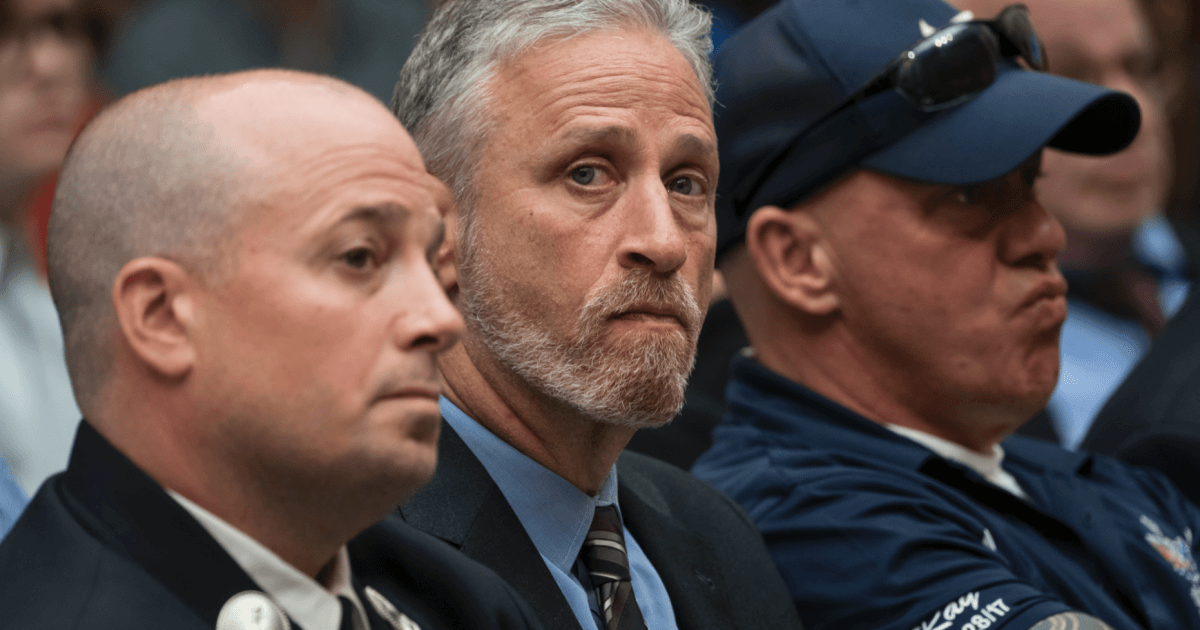In the days, weeks, and months following the 9/11 attacks, at least 400,000 people were exposed to hazardous fumes and particles such as asbestos, lead, and benzene, putting them at serious risk for long-term health effectsincluding cancer. Tens of thousands of 9/11 first responders and survivors have already been diagnosed with cancer, and of those exposed, an estimated 300,000 people aren’t accessing the government assistance they need for cancer screenings, treatment, and care.
And now the Victim Compensation Fund (VCF) that was established to cover 9/11-related health costs for those affected is running out of money.
Read More"There is not one person here… there is not one empty chair on that stage that didn’t tweet out, ‘Never forget the heroes of 9/11,'" Stewart said, calling out the members for their hypocrisypublicly voicing support for the victims and then failing to show up for the hearing. "Sick and dying, they brought themselves down here to speak to no one. Shameful. It is embarrassing to the country and it is a shame on this institution."
After his words, Stewart received a standing ovation.
Support for his comments permeated the media, as advocates and supporters, including celebrities like Jimmy Kimmel, tweeted out thanks to Stewart for holding lawmakers accountable.
thank you Jon Stewart, for making sure “never forget” isn’t just a nice-sounding slogan https://t.co/mV6kcfLYGI
Jimmy Kimmel (@jimmykimmel) June 11, 2019
To be sure, Rep. Steve Cohen (D-Tenn.) later responded to Stewart's strong words, pointing out that there were only empty chairs because the hearing was specifically for a subcommittee of the full House Judiciary Committee, not because, as Stewart had implied, lawmakers had chosen not to attend.
Empty seats or no empty seats, though, Stewart's call-to-action to compensate the sick was the most pressing part of his monologue.
The law that reinstated the Victim Compensation Fund after it first expired in 2010, the James Zadroga 9/11 Health and Compensation Act, was extended five years in 2015, and is now coming up on its expiration again, in 2020. But with its dwindling funds, the VCF might not even be able to complete payouts for every claim through 2020.
On the official website for the VCF, a notice reads: "On February 15, 2019, the Special Master determined that the funding remaining in the VCF would be insufficient to pay all pending and projected claims under current VCF policies and procedures and, consequently, announced modifications to VCF policies consistent with her statutory obligations."
Retired New York Police Department (NYPD) detective Luis Alvarez addressed the representatives, too. After sharing that he was scheduled to go in for his 69th round of chemotherapy to treat his 9/11-linked cancer the following day, Alvarez said, “I should not be here with you, but you made me come. You made me come because I will not stand by and watch as my friends with cancer from 9/11, like me, are valued less than anyone else.”
Alvarez and Stewart are not alone in their resolve to help those diagnosed with 9/11-linked cancer. SurvivorNet previously spoke with John Feal, 9/11 first responder and founder and president of the Feal Good Foundation, which helps those get the healthcare and cancer screenings they need (which would be the same goal as the legislation those attending the hearing called for).
"I look over my shoulder every day wondering, when do I get 9/11 cancer? There’s now over 90,000 people in the World Trade Center Health Program that were affected by 9/11," Feal said. "Over 40,000 of them are being treated for more than two illnesses. This is real. This is not made up. This is staggering."
Unfortunately, these numbers are only growing, and many of those who are now being diagnosed say they were led to believe they didn’t have anything to worry about.
Amit Friedlander, who was class president at Stuyvesant High School (just blocks from Ground Zero) during the 2001 attacks, ended up diagnosed with a blood cancer linked to the carcinogens in the air.
“I definitely wasn’t thinking about it,” Friedlander told SurvivorNet. “I know people were covered in all the residue and just everything. But there were no initial conversations.”
A week after the attacks, the Environmental Protection Agency (EPA) told residents the air was safe in Lower Manhattan. But with every cancer diagnosis, it becomes increasingly clear that this wasn’t the case.
"The vast majority of the victims of 9/11 didn't die the day of the towers going down," Dr. Gaetane Michaud, Chief of Interventional Pulmonary Medicine at NYU Perlmutter Cancer Center told SurvivorNet back in September. "There are a lot of people out there who either have died or are going to die from those fumes, from those dusts."
According to the National Institute for Occupational Safety and Health (NIOSH), over 68 different types of cancers have been linked to 9/11 already, the most common of which are thyroid cancer, prostate cancer, skin cancer, breast cancer, and blood cancers like lymphoma and multiple myeloma. Cancers with longer latency periods like mesothelioma are beginning to emerge, too.
The full House Judiciary Committee is supposed to vote on a bill extending the Victim Compensation Fund today, and lawmakers, survivors, and advocates alike are hopeful it will pass.
Learn more about SurvivorNet's rigorous medical review process.


